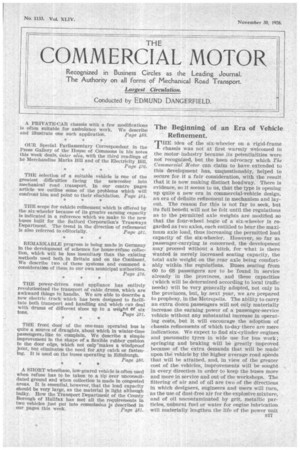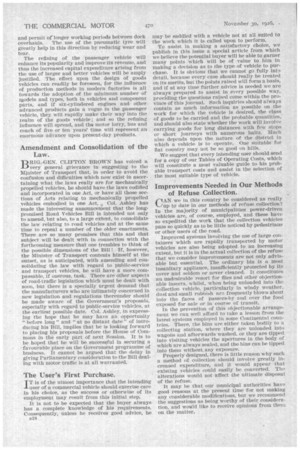The Beginning of an Era of Vehicle Refinement.
Page 43

Page 44

If you've noticed an error in this article please click here to report it so we can fix it.
THE idea of the six-wheeler on a rigid-frame chassis was not at first warmly welcomed in the motor industry because its potentialities were not recognized, but the keen advocacy which The Commercial Motor can claim to have extended to this development has, unquestionably, helped to secure for it a fair consideration, with the result that it is now making distinct headway. There is evidence, so it seems to us, that the type is opening up quite a new era in commercial-vehicle design, an era of definite refinement in mechanism and layout. The reason for this is not far to seek, but its full benefit will not be felt until the regulations as to the permitted axle weights are modified so that the four-wheel bogie of a six-wheeler is regarded as two axles, each entitled to bear the maximum axle load, thus increasing the permitted load capacity of the six-wheeler. However, so far as passenger-carrying is concerned, the development may proceed without a hitch, for what is there wanted is merely increased seating capacity, the total axle weight on the rear axle being comfortably within the regulations. Buses seating from 60 to 68 passengers are to be -found in service already in the provinces, and these capacities (which will be determined according to local traffic needs) will be very generally adopted, not only in the provinces, but, by next year, we are prepared to prophesy, in the Metropolis. The ability to carry an extra dozen passengers will not only materially increase the earning power of a passenger-service vehicle without any substantial increase in operating costs, but it will encourage the adoption of chassis refinements of which to-day there are mere indications. We expect to find six-cylinder engines and pneumatic tyres in wide use for bus work ; springing and braking will be greatly improved because of the extra demands that will be made upon the vehicle by the higher average road speeds that will be attained, and, in view of the greater cost of the vehicles, improvements will be sought in every direction in order to keep the buses more and more in service and out of the workshops. The filtering of air and of oil are two of the directions in which designers, engineers and users will turn, 'as the use of dust-free air for the explosive mixture, and of oil uncontaminated by grit, metallic particles, unburnt fuel or water for engine lubrication will materially lengthen the life of the power unit B17 and permit orlonger working periods between dock overhauls. The use of the pneumatic tyre will greatly help In this direction by reducing wear and tear.
The refining of the passenger vehicle will enhance its popularity and improvelts revenue, and thus the increased capital expenditure arising from the use of larger and better vehicles will be amply justified. The effect upon the design of goods vehicles can readily be foreseen, for the influence of production methods in modern factories is all towards the adoption of the minimum number of models and types, both in vehicles and component parts, and if six-cylindered engines and other advanced products gain a vogue in the passenger vehicle, they will rapidly make their way into the realm of the goods vehicle ; and so the refining influence will spread, and the motor lorry, bus and coach of five or ten years' time will represent an enormous advance upon present-day products.
Amendment and Consolidation of the • Law.
BRIG.-GEN. CLIFTON BROWN has voiced a very general grievance in suggesting to the Minister of Transport that, in order to avoid the confusion and difficulties which now exist in ascertaining what the laws really are for mechanically propelled vehicles, he should have the laws codified and incorporated in one Act, or have all those sections of Acts relating to mechanically propelled vehicles embodied in one Act. Col. Ashley has made the Interesting announcement that the longpromised Road Vehicles Bill is intended not only to amend, but also, to a large extent, to consolidate the law relating to road vehicles and at the same time to repeal a number of the older enactments. There are so many promises that this and that subject will be dealt with in connection with the forthcoming measure that one trembles to think of the possible dimensions of the Bill If, however, the Minister of Transport contents himself at the outset, as is anticipated, with amending and consolidating the law with regard to public-service and transport vehicles, he will have a more compassable, if onerous, task. There are other aspects of road-traffic legislation which must be dealt with soon, but there is a specially urgent demand that the manufacturers who are intimately concerned in new legislation and regulations thereunder should be made aware of the Government's proposals, especially with regard to public-service vehicles, at the earliest possible date. Col. Ashley, in expressing the hope that he may have an opportunity " before long" and "at no distant date" of introducing his Bill, implies that he is looking forward to placing his proposals before the House of Commons in the early part of next Session. It is to be hoped that he will be successful in securing a favourable place on the Government programme of business. It cannot be argued that the delay in giving Parliamentary consideration to the Bill dealing with motor traffic is at all warranted.
The User's First Purchase.
TT is of the utmost importance that the intending Xuser of a commercial vehicle should exercise care in his choice, as the suceess or otherwise of its employment may result from this initial step.
It is not to be expected that the buyer always has a complete knowledge of his requirements. Consequently, unless he receives good advice, he B18 may be saddled with a vehicle not at all suited to the work which it is called upon to perform.
To assist in making a satisfactory choice, we publish in this issue a special article from which we believe the potential buyer will be able to garner many points :which will be of .value to him in making a decision as to the type of vehicle to purchase. It is obvious that we cannot go fully into detail, because every case should really be treated on its merits, but the points raised will form a basis, and if at any time further advice is needed we are always prepared to assist in every possible way, providing the questions raised come within the province Of this journal. Such inquiries should always contain as much information as possible on the work for which the vehicle is desired, the class of goods to be carried and the probable quantities, and should also state whether the work will involve carrying goods for long distances with few stops or short journeys with numerous halts. Much also depends upon the nature of the district in which a vehicle is to operate. One suitable for flat country may not be so good on hills.
We suggest that every intending user should send for a copy of our Tables of Operating Costs, which will constitute a most valuable guide to his probable transport costs and assist in the selection of the most suitable type of vehicle.
Improvements Needed in Our Methods of Refuse Collection.
CAN we in this country be cOnsidered as really up to date in our methods of refuse .collection? In the majority of municipalities power-driven vehicles are, of course, employed, and these have so expedited the work that the collection vehicles pass so quickly as to be little noticed by pedestrians or other users of the road.
Improved systems Involving the use of large containers which are rapidly transported by motor vehicles are also being adopted to an increasing extent, but it is in the actual collection of the refuse that we consider improvements are not only advisable but essential. The ordinary bin is a most insanitary appliance, insufficiently protected by Its cover and seldom or never cleaned. It constitutes an undesirable resort for flies and other objectionable insects, whilst, when being unloaded into the collection vehicle, particularly in windy weather, dust and small rubbish are frequently blown about into the faces of passers-by and over the food exposed for sale or in course 1if transit.
In the prevention of this objectionable arrangement we can well afford to take a lesson from the. latest systems employed in some Continental countries. There, the bins are either taken bodily to a collecting station, where they are unloaded into wagons and afterwards washed, or. they are tipped into visiting vehicles the apertures in the body of which are always sealed, and the bins can be tipped into them without any exposure.
Properly designed, there is little reason why such _ a method of collection should involve greatly increased expenditure, and it would appear that existing vehicles could easily be converted. The alterations would not affect the ultimate disposal of the refuse.
It may be that our municipal authorities have good reasons at the present time for not making any considerable modifications, but we recommend the suggestions as being worthy of their consideration, and would like to receive opinions from them on the matter.




















































































































